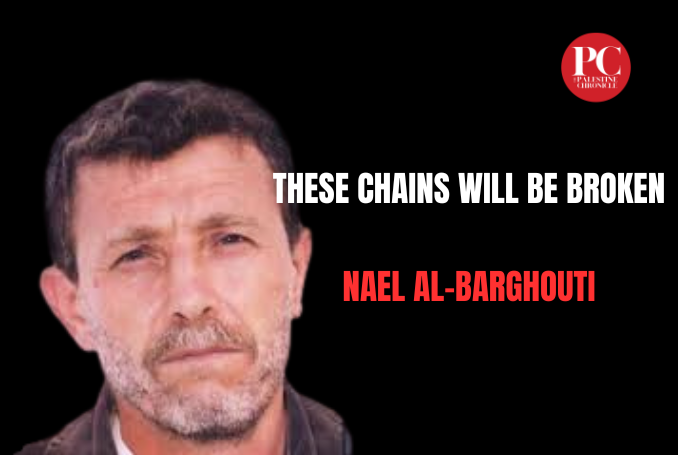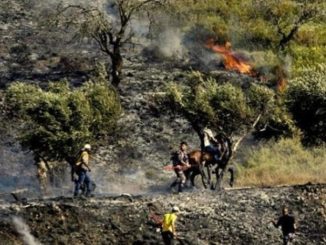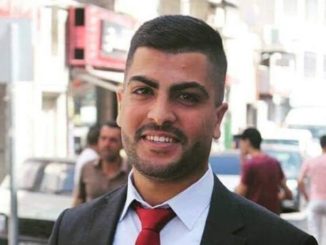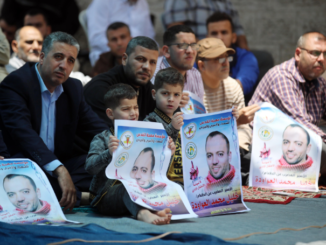
Starting on Friday, November 24, a prisoner swap between the Palestinian resistance and Israel began in stages. On Friday, 39 Palestinian prisoners were released. More prisoners were freed on Saturday and Sunday.
They included Hanan al-Barghouti, the youngest sister of the Palestinian longest-serving prisoner, Nael.
Nael’s story was included in Ramzy Baroud’s volume ‘These Chains Will Be Broken: Palestinian Stories of Struggle and Defiance in Israeli Prisons’. (Clarity Press.)
The text below appeared in a chapter entitled “Love Behind Bars”.
Nael al-Barghouti and Iman Nafi’ – narrated by Iman Nafi’
Nael Saleh al-Barghouti was born on October 24, 1957, in the village of Kobar, north of Ramallah in the West Bank. His five-member family includes his parents, his older brother, Omar, and his younger sister, Hanan. His father is Saleh al-Barghouti, a kindly man with strong religious beliefs, and his mother is a famed Palestinian poetess known as “Farha”. They subsisted on farming, a tradition that runs deep in their family, forming an unbreakable bond between them and their land.
Nael was a student activist who took part in many protests against the Israeli occupation. He was arrested by Israeli soldiers from his family home in Kobar on April 4, 1978. After a long and harsh interrogation, he was sentenced to 112 years in prison for allegedly killing an Israeli occupation officer north of Ramallah. His brother, Omar, was also arrested, along with his cousin, Fakhri. Omar spent 26 years in prison, while Nael spent 34 years. Nael was released in a prisoner exchange between the Palestinian resistance and Israel in 2011.
Both brothers were detained, once more, shortly after their release.
Iman Nimr Sarhan Nafi’ was born in 1964 in the village of Ni’lin before her family moved to the city of Ramallah, six years later. Like Nael’s family, the Nafi’s are also farmers. Iman studied nursing and joined a local hospital where she interacted with a mixed group of people, Palestinians and international medical staff. She describes her life in that period as “beautiful”, especially as she drove her own car and had an exciting social life.
But such relative contentment was often interrupted by the Israeli occupation. Israeli soldiers raided the Nafi’ family home many times, arresting and re-arresting Iman’s brother. Happiness completely eluded Iman when her brother was shot in front of her during a protest in the city of Ramallah. While her political consciousness was formed at an early age, the wounding of her brother while peacefully protesting the Israeli occupation turned her life upside down.
Iman would soon join her people’s resistance against Israeli occupation.
Love behind Bars
I was only 17 years old when, in 1981, I was first arrested by the Israeli army. But I was in prison for only a short period of time, since I was merely accused of organizing protests in my school, demanding freedom from Israel. Six years later, the stakes were much higher. On November 25, 1987, the soldiers came for me. They arrested me and, later, they arrested my mother and my brother. My mother, especially, suffered so much in jail since she was very ill.
I was held in Al-Maskobieh Detention Center, in Jerusalem, where I was subjected to very harsh interrogation as I was accused of planning to carry out an attack against an Israeli target in Yafa Street in Jerusalem. I remained strong despite the intense pressures, until I heard my mother’s voice coming from one of the adjacent interrogation rooms. I tried to force my way through the soldiers while yelling: “My mother has nothing to do with this!”
They kept us both in one cell that was filled with rodents and cockroaches. My mother was very ill. Her high blood pressure required constant medical attention, none of which she received during her unfair imprisonment. She had difficulty in breathing, before she collapsed. I began screaming like a crazy person. Just seeing my poor mom lying on the dirty floor, unconscious, made me lose my mind. A while later, a soldier came with one of her blood pressure pills which they had confiscated. She was revived, but remained with me in the same dirty cell.
My mother was eventually released, but I was sentenced to 15 and a half years in prison. It hardly helped that the list of charges included an assault on a female prison guard. I needed to defend myself, as she had assaulted me and physically abused me while in detention. I spent ten of those years in prison and was released in 1997. Since then, I have dedicated my life to defending the rights of prisoners through my work with the Prisoners Club. It would be years before I met, fell in love with and married Nael. Even though we did not live together for a long time, I feel as if he has been a part of me for my entire life.
Like me, Nael was only a high school student when he was arrested. But, unlike me, his accusation was far more serious. In 1978, they charged him with the killing of an Israeli occupation soldier. He had spent more time in Israeli prisons than any other Palestinian prisoner. Although he was released in a prisoner exchange in 2011 after spending 34 uninterrupted years in Israeli jails, he was arrested again, along with 70 other freed prisoners. The Israeli government has decided to reinstate the 117 years sentence he was serving before they freed him. Every day, I pray for his freedom.
Two weeks after Nael was released, we began the wedding preparations, to be fully betrothed two months later. He was so desperate to claim a sense of normalcy in his life; he returned to farming his land in the village of Kobar near Ramallah, as soon as he was free. Sadly, the soldiers came back for him before he harvested what he had sown.
Nael’s world had completely changed during his long imprisonment. His only sister was 12 years old when he was arrested. When he was released, she was a grandmother. But Nael did meet her eldest son, ‘Inad, when he was arrested and imprisoned with his uncle. Nael met his nephew for the first time in prison.
Many loved ones passed away while Nael was in captivity. His father died in October 2004, and his mother followed, a year later. Despite every attempt to allow Nael to say goodbye to his dying mother, he was denied that basic human right as well.
I was so happy to be married to Nael. He, too, was thrilled. We both found love, and our life, for once, seemed to get back on track. Great festivities ensued. It was major news all over Palestine. Many freed prisoners with their families had joined our happy family in a traditional wedding that I would never forget. The Barghouti and Abu Haniyeh Nafi’ clans were united in a rare moment of happiness.
Of course, we had to follow all traditional steps that usually precede the finalization of a marriage. Nael headed a delegation of respected men from Kobar who came to my original village, Ni’lin, officially asking for my hand. I cannot describe the feeling of joy in my family home on that day. I felt that our happiness was an act of defiance, of resistance, especially after being deprived of freedom for so long. We were separated by prison but united in our love for our homeland, and our faith in the justness of our struggle.
But according to custom, someone other than Nael had to make the official request. Walid al-Haoudali was chosen for that task. Walid is an old comrade of Nael. They spent many years together in prison and were freed together. Walid stood and asked my uncle, Dheib, and my brother, Imad, for my hand. They immediately agreed, requesting only one Jordanian dinar as dowry. The amount was symbolic. It meant that my family was invested in Nael as a man, regardless of money or wealth. His reputation as a leader in our struggle for freedom was more than enough.
Then, Nael stood up and uttered these words:
“As a freed prisoner, I consider my marriage to another freed prisoner a victory against prison, a challenge to those who deprived us from our freedom, and a triumph of the spirit of faith and hope. This joyous occasion is only the first step in unlocking the door of the life that still lies ahead of us. They denied us freedom, but didn’t kill our determination to break our chains. Now, I can say that Iman and I will embark on a new journey, as we are about to start yet another family among this great nation. We pray to God that He completes our happiness and joy, and heals our wounds that have bled for too many years, leaving deep memories that will live with us forever. But these memories shall also serve as lessons that will strengthen our resolve to continue our march for freedom.”
His passion and his strength were so palpable. He moved people. He moved me. I was immensely proud of him and excited about our life together.
Nael did not stop there. He spoke about those who died while he was in prison. He remembered his mother and his father. He spoke about our people in Gaza, their legendary struggle in their larger prison. He spoke about Palestinians in the diaspora and the need to strengthen our collective identity through celebrating our memories and our culture. “One day, all of us Palestinians shall be united together and that is the true celebration,” he said. People nodded in agreement. Lots of tears fell on that day. Lots of hugs and kisses.
Happiness was real. I felt it.
Nael is a Palestinian hero. I have known of his heroism, his steadfastness and leadership in prison for many years. He is a special person. He belongs to a revolutionary school that is true and authentic and comes from the land itself. I have known so many details about his life, from what I have read and heard. When he came asking for my hand, I told my family that I agree without any hesitation. In him I saw a faithful life partner.
After we officiated the marriage, I thanked God for this precious gift. I was determined to build a happy family together, and do my best to compensate Nael for the 34 years he spent in prison. I knew the harsh conditions under which he was held as I had experienced some of that myself. I knew it would not be easy, but our love for each other, for Palestine and our faith in God would overcome all obstacles.
We lived together for 31 months before the Israeli army came to our house and re-arrested him. They gave no reason whatsoever as to why they reneged on the prisoner exchange agreement. He has been back in prison for years, and every hour of every day I think of him, of his suffering in prison and of the life that still awaits us.
From prison, he wrote this: “When a nation seeks its freedom, it will always prevail. The occupation will never succeed in planting defeat in our hearts, because we summon our courage from our faith in God and from the legacies of all the nations that sought and achieved their freedom and dignity.”
Israel tries to impose restrictions on Nael in prison, to isolate him from others and from me, so that his messages to his people do not make it outside prison. But they will never succeed.
Nael is over 60 years old now, but the older he gets, the more rooted he becomes in his revolution, in his faith, in his land, in beautiful Kobar, in Palestine.
He is a Palestinian hero.









Very beautiful love story behind the prison. This is True Love ????
From The River to The Sea; PALESTINE WILL BE FREE
Long Live PALESTINE
Long Live Abu Ubaida